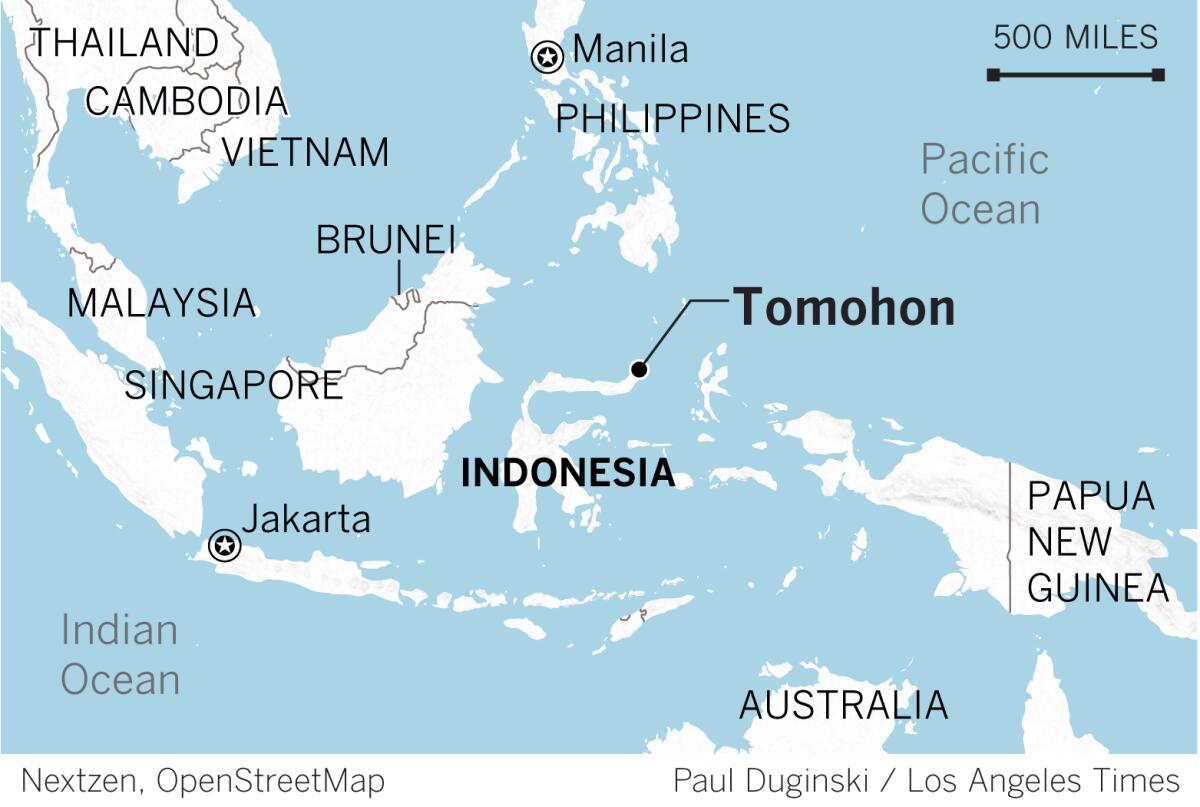Why the dog meat trade persists in Indonesia, despite consumption being illegal
- Share via
TOMOHON, Indonesia — The sale of dog meat for consumption is technically illegal in Indonesia, but visitors wouldn’t be able to tell walking through the crowded central market in Tomohon.
Butchers in this remote, rural city in the equatorial province of North Sulawesi have no reservations about displaying the animals for sale after bludgeoning them and then charring the carcasses to remove their fur.
Dog meat isn’t recognized as food under Indonesian law, which makes it illegal to sell in the market. Workers in the trade also violate the law when they regularly transport dogs between provinces where rabies is endemic. Of Indonesia’s 34 provinces, only eight are considered rabies-free.
The trade persists because local governments have rarely enforced those laws, local animal activists say.
The Tomohon market was the focus of videos recorded by Los Angeles animal rights activist Marc Ching when he visited the area in 2016. Horrific images from that trip appeared in a public service announcement featuring Matt Damon, Joaquin Phoenix, Rooney Mara and other celebrities in support of Ching’s charitable foundation, which raises awareness about the brutality of the enduring dog meat industry in various Asian countries.
But a Times investigation has found evidence that contradicts Ching’s claims about the authenticity of some of the most shocking videos.
Activist Marc Ching, whose work won support from Joaquin Phoenix, Matt Damon and other celebrities, denies paying butchers in Asia to harm dogs.
Butchers told The Times that Ching paid them to hang and burn a dog alive and kill several more while he recorded video. Ching’s raw footage shows that as the burning begins, one of the butchers looks toward the camera, flashes a thumbs up and asks a question in a language local to the area whose English translation is, “This is exactly what you want, right?”
Ching denies paying butchers to harm dogs or orchestrating any of the videos. His foundation has questioned the butchers’ credibility, saying his work threatened their livelihoods.
Indonesia, the world’s fourth-most populous nation, spread across more than 17,000 islands, is notoriously difficult to govern. Local traditions often trump edicts delivered from the faraway capital in Jakarta.
Nevertheless, a movement is growing to end the dog and cat meat trade in Indonesia, which has received a boost from concerns about how rural markets could spread diseases like COVID-19.
Many middle-class Indonesians in larger cities, particularly in Jakarta and its outskirts, have embraced pet ownership, yet the practice of eating dogs continues in a few rural parts of the country.
“What’s happening in Tomohon is not representative of the nation’s perception and attitude toward companion animals,” said Lola Webber, the Bali-based co-founder and director of the Change for Animals Foundation, a charity registered in England. “People outside the dog meat-eating hot spots would not believe this behavior and practice persists. There’s a certain amount of disconnect.”

Tomohon is roughly 1,300 miles from the nation’s capital but a world a way. The city of 120,000 people is connected to the provincial capital, Manado, by a winding two-lane mountain road with commanding views of the Celebes Sea.
Tucked in a lush valley flanked by two active volcanoes that often billow smoke, the area’s remoteness has preserved a way of life that’s lasted centuries, untouched by modern malls, hotel chains or Western fast food.
The dominant ethnic group in Tomohon, the Minahasa, savor dog meat on special occasions. The meat is believed to keep one’s body warm and is enjoyed “RW” style, which involves simmering it in an aromatic sauce made with chiles, galangal, lime leaves and turmeric.
Butchers say the dogs are specially raised for their meat, but animal rights activists say many that are sold are strays captured locally or from neighboring provinces.
Unlike most other parts of Indonesia, where Muslims make up the overwhelming majority, Tomohon is a Christian enclave that was influenced by Europeans starting in the 1500s — first with the Portuguese, then the Spanish and the Dutch. Customs here are interwoven with Catholic, Protestant and animist beliefs. One tradition included spilling blood from a freshly slaughtered dog, symbolizing strength, on the beams of a new house. The meat was then consumed.
A whistleblower and watchdogs raise concerns over cash withdrawals, allegedly deceptive solicitations and other financial practices at the Animal Hope & Wellness Foundation. The charity denies misleading donors or misusing money.
“Dogs have always been used in rituals,” said H.B. Palar, a local historian and expert on the Minahasa.
There aren’t taboos about which animals to eat, mostly out of necessity, he added.
In the late 1950s, the region around Tomohon was the center of the so-called Permesta rebellion against the central government — an uprising driven by anger that Javanese rulers in Jakarta were neglecting Indonesia’s far-flung islands such as Sulawesi and their ethnic minority inhabitants.
The army responded with brutal force and the rebels fled to the surrounding jungles, where they couldn’t cultivate food. To survive, they had to eat animals that were considered exotic during peacetime.
“Food was scarce,” Palar said. “That’s why they had to eat monkey, snake, dog and even bats. After the crisis, the tradition continued.”
More to Read
Sign up for Essential California
The most important California stories and recommendations in your inbox every morning.
You may occasionally receive promotional content from the Los Angeles Times.












